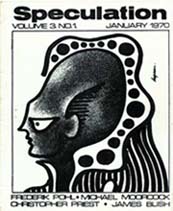Difference between revisions of "Speculation"
| Line 1: | Line 1: | ||
| − | [[Image:Speculation25-Web_copy.jpg|right|frame|'''Speculation''' Issue 25 Cover Art by Richard Bergeron | + | [[Image:Speculation25-Web_copy.jpg|right|frame|'''Speculation'''<br/> Issue 25 1970 <br/>Cover Art by Richard Bergeron ]] |
'''Speculation''' was an award-winning British [[fanzine]] edited by [[Peter Weston]]. | '''Speculation''' was an award-winning British [[fanzine]] edited by [[Peter Weston]]. | ||
Revision as of 23:19, 12 December 2011
Speculation was an award-winning British fanzine edited by Peter Weston.
Speculation was released under the title Zenith for the first six issues, which lasted from 1963 till 1964. It was then called Zenith Speculation for issues 7 to 13, between 1964 and 1966, during which time Peter Weston was also publishing the apazine Nexus. After 1966, the fanzine assumed its final identity, Speculation.
Contributors to Speculation include Brian Aldiss, Greg Benford, John Boston, John Brosnan (Big Scab), Ken Bulmer (Science Fantasy News), F.M. Busby (Cry of the Nameless), Richard Delap, John Foyster, Richard Gordon, Tim Hildebrand, Lang Jones, David Masson, Archie Mercer (Vector), Beryl Mercer (Link, Oz), Michael Moorcock (Typo, A Fanzine Called Eustace), Larry Niven, Andy Offut, Alexei Panshin, Joe Patrizio (Ipso Facto), John J. Pierce, writing on Cordwainer Smith, Martin Pitt, Charles Platt (Beyond), Chris Priest, Bob Rickard, and Ben Solon.
Issue 25 featured a cover by Richard Bergeron (Warhoon). Artwork was contributed by Jim Cawthorn, Eddie Jones, and Vincent DiFate, among others.
Speculation also featured an interview with writer J.G. Ballard.
A special issue of Speculation was part of the Thirdmancon Combozine (April 1968), which also included special issues of Badinage, Gothique, and Scottishe.
A series of "Speculation Conferences" were also organised, adopting a similarly "sercon" approach to science fiction analysis. It won the very first Nova Award for Best Fanzine, in 1973.
